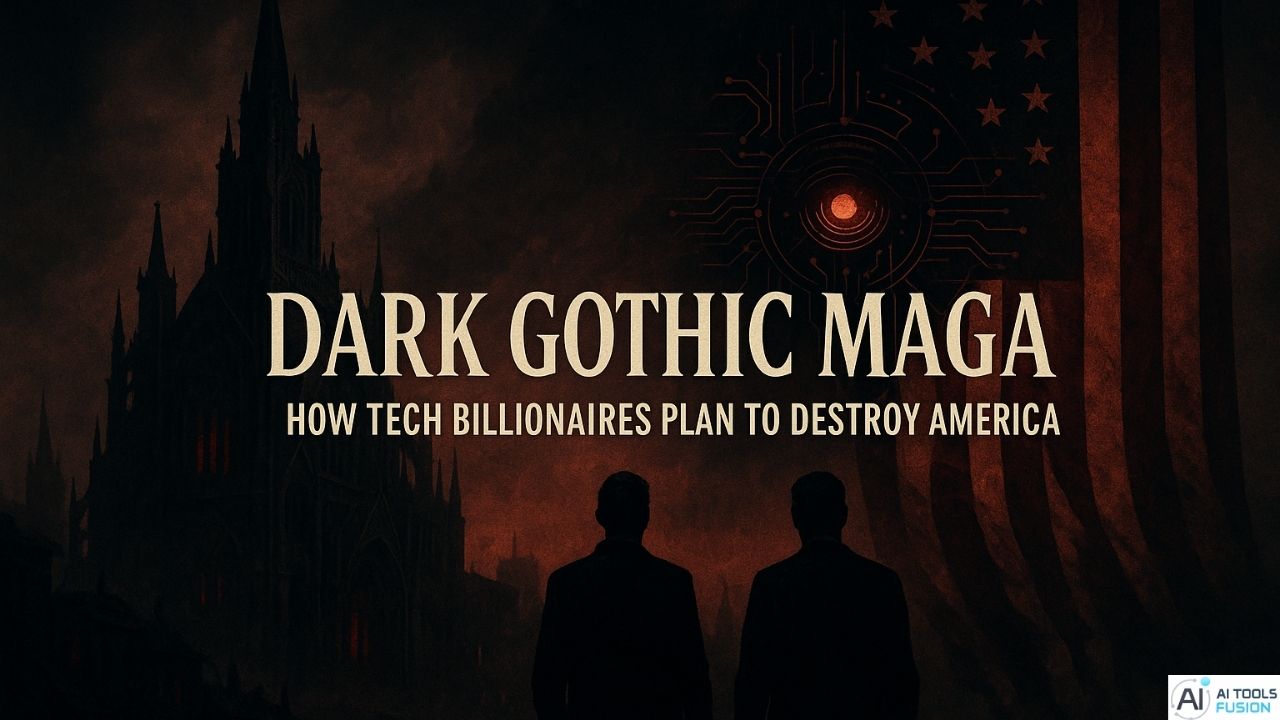Dark Gothic MAGA: How Tech Billionaires Plan to Destroy America

In the shadowy corridors of power, where technology meets ideology, a new narrative is unfolding—one that intertwines the dark allure of Gothic fiction with the contemporary complexities of political influence. “Dark Gothic MAGA: How Tech Billionaires Plan to Destroy America” delves into the clandestine strategies of a privileged elite whose ambitions transcend traditional boundaries. As the digital age offers unprecedented leverage, these titans of industry are crafting a dystopian vision that threatens to unravel the very fabric of democracy. This exploration reveals the intricate web of wealth and power, raising urgent questions about the future of American society.
Dark Gothic MAGA: How Tech Billionaires Plan to Destroy America
The Rise of Dark Gothic MAGA: A New Era in American Politics
A Fusion of Dark Gothic Aesthetics
The “Dark Gothic MAGA” movement signifies a striking confluence of gothic aesthetics with the traditional MAGA ideology, underpinning a transformation in American politics. This fusion creates a unique visual and ideological landscape, contributing to its growing allure and influence.
Influential Figures in the Movement
Prominent tech billionaires, such as Elon Musk and Peter Thiel, have emerged as pivotal figures in this movement. Their involvement suggests a deliberate strategy to leverage wealth and technological prowess to support the far-right agenda, potentially reshaping America’s democratic framework.
Catalysts for Transformation
Central to this new era is Curtis Yarvin’s provocative ideas, which guide political maneuvers that threaten to dismantle liberal democracy. By redefining political discourse and realigning platforms, the movement not only challenges existing structures but also aims to inaugurate an autocratic regime.
Prophecies in Chaos: How Nostradamus Might Have Predicted This
The Unseen Shadows of Prophecy
Nostradamus, known for his enigmatic quatrains, might have captured the chaotic undercurrents of today’s societal disruptions. His descriptions of “cruel wars” and economic collapse align with modern anxieties surrounding technological dominance and political upheaval. Interpretations suggest these dark gothic prophecies indicate an unsettling trajectory for global powers, especially in contexts where tech billionaires plan to destroy America, mirroring fears seen in polarized politics and financial instability, reminiscent of modern challenges.
Tech Billionaires and Their Hidden Agendas

Influence and Power
The rise of tech billionaires has significantly altered the landscape of American politics, with figures like Elon Musk and Jeff Bezos leveraging their enormous wealth and media platforms to mold public opinion. Musk, in particular, has evolved from a socially liberal voice to one of dark ruminations on social media, highlighting his shift as a fervent supporter of divisive agendas (Le Monde).
Consequences for Democracy
These billionaires not only support specific political figures but also pursue agendas that undermine democratic processes. By manipulating media narratives and concentrating media ownership, they seek to suppress dissenting voices and reshape legislative priorities. Such activities raise critical questions about the implications of a tech billionaire-driven future for American democracy.
The Vision Beyond Borders
Exploring concepts like “network states,” initiatives backed by tech magnates promise autonomy and innovation. Yet, these visions of decentralized governance also evoke concerns of morphing into authoritarian corporate regimes, potentially dismantling traditional democratic values in favor of efficiency-driven governance.
This seamless integration of corporate ambitions with political and societal influence portrays a grim picture of “Dark Gothic: How Tech Billionaires Plan to Destroy America.”
Cognitive Marketing: From Perception to Purchase
Understanding Perception
Cognitive marketing begins at perception, where visual design and sensory cues significantly influence consumer behavior. By employing AI tools, marketers can effectively trigger cognitive biases to foster lasting impressions. This strategic use of perception channels consumers towards specific actions that resemble a Dark Gothic: How Tech Billionaires Plan to Destroy America narrative, highlighting the manipulation potential in today’s digital age.
The Purchase Pathway
Transitioning from perception to purchase involves leveraging cognitive biases like anchoring and scarcity. Brands use compelling narratives and persuasive messaging to guide consumers through their purchase journey. Trust signals play a vital role in mitigating cognitive dissonance during this process. This tailored approach demonstrates cognitive marketing’s power to mold consumer decisions efficiently, as outlined in various cognitive marketing practices.
Why Luxury Brands Are Shedding the Frills on Their Logos
The trend of luxury brands opting for minimalist logos over intricate designs reflects a significant shift in branding strategies. Simplification aligns with a broader cultural move towards egalitarianism and modern utility, distilling luxury to its essence without overt opulence. This change seeks resonance with younger, more environmentally conscious consumers who value authenticity over grandeur. Moreover, in a digital era, minimalist logos adapt better to social media’s rapid pace, ensuring clear recognition across various platforms.
How to Make ChatGPT Recommend Your Company
Leverage High-Quality, Structured Content
To ensure ChatGPT recommends your company, focus on crafting high-quality and structured content. Utilize keyword optimization, including the phrase “Dark Gothic: How Tech Billionaires Plan to Destroy America,” to increase visibility in AI-generated recommendations. Implementing schema markup and providing clear, concise answers to user queries enhances your content’s discoverability, ensuring AI tools like ChatGPT better understand your offerings and present them effectively in user queries.
More from Marcos G. Figueira, DSc.
Educational Insights and Expertise
Marcos G. Figueira, DSc., a seasoned educational technologist, offers profound insights into the interplay between technology and learning. Drawing from his extensive experience across educational institutions, he emphasizes the necessity of adapting curricula to meet the evolving needs of a technology-driven society. Through his work, Figueira explores how “Dark Gothic: How Tech Billionaires Plan to Destroy America” impacts public educational systems, highlighting the urgent need for pedagogical resilience amid such disruptive ambitions.
What is Dark Gothic MAGA?
Dark Gothic MAGA is a term that reflects a radical movement driven by tech billionaires seeking to reshape America’s democracy. Figures like Elon Musk and Peter Thiel spearhead the initiative, advocating for a governance model that diminishes democratic institutions in favor of tech-led autonomy. Their strategy involves dethroning traditional political frameworks, fortifying their vision with resources and influence through political candidates and think tanks. Their ultimate aim is to instill a monarchy of tech elites.
Conclusion
In scrutinizing the unsettling alliance between technology magnates and the forces driving the Dark Gothic MAGA movement, it becomes clear that the implications for American society are profound and far-reaching. These tech billionaires, wielding unprecedented influence and resources, are poised to shape the nation’s future in ways that may undermine democratic institutions and social cohesion. As America stands at this critical juncture, the need for vigilant oversight and informed public discourse has never been more vital. Only through collective awareness and action can the nation safeguard its foundational values against a backdrop of digital dystopia and ideological extremes.
See Also: Exploring DOGE AI Tool Government Automation Initiatives
